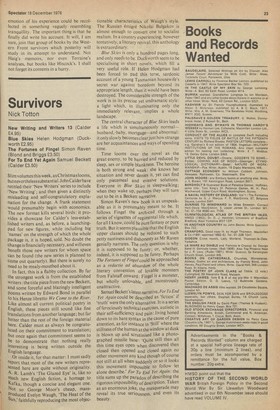Survivors
Nick Totton
New Writing and Writers 13 (Calder £4.95) Blue Skies Helen Hodgman (Duckworth £2.95) The Fortunes of Fingel Simon Raven (Blond and Briggs £3.50) For To End Yet Again Samuel Beckett (Calder £3.50) Slim volumes this week, as Christmas looms, but nevarthelesssubstantiall ohn Calder have retitled their 'New Writers' series to include 'New Writing': and then given a distinctly misleading and self-congratulatory explanation for the change. A frank statement would presumably begin with economics. The new format kills several birds: it provides a showcase for Calder's less-established writers and, as before, a launchingPad for new figures, while including big 'names' on the strength of which the whole Package is, it is hoped, sold. No doubt the Change is financially necessary, and will even benefit those new writers for whom space can be found (the new series is planned to come out quarterly). But there is surely no need to be mealy-mouthed about it.
In fact, this is a flabby collection. By far the strongest work is from the established writers: the title piece from the new Beckett, and some forceful and blazingly intelligent Poems written by Edward Bond in parallel to his Henze libretto We Come to the River. Like almost all current political poetry in English, these pieces still sound like fine translations from another language; but far better than the rest of the foreign material here. Calder must as always be congratulated on their commitment to translation; but once again that commitment seems to be to demonstrate that nothing really interesting is being written outside the English language.
Or inside it, for that matter: I must sadly report that most of the new writers represented here are quite without originality. A. R. Lamb's 'The Glazed Eye' is, like so Much new English fiction, a homage to Kafka, though a concise and elegant one. Not so George Moor's cheap, massProduced Evelyn Waugh, 'The Heat of the Sun,' faithfully reproducing the most objec
tionable characteristics of Waugh's style. The Russian émigré Nikolai Bulgakov is almost enough to convert one to socialist realism. In a country experiencing, however tentatively, a literary revival, this anthology is extraordinary.
Blue Skies is only a hundred pages long, and only needs to be. Duckworth seem to be specialising in short novels, which fill a very useful role. If Helen Hodgman had been forced to pad this terse, sardonic account of a young Tasmanian housewife's secret war against boredom beyond its appropriate length, then it would have been destroyed. The considerable strength of the work is in its precise yet undramatic style: a light which, in illuminating only the immediately relevant, implies a whole landscape.
The central character of Blue Skies leads a life which is simultaneously normal— husband ,'baby, mortgage—and abnormal: it only slowly becomes clear just how strange are her acquaintances and ways of spending time.
Time looms over the novel as the great enemy, to be harried and reduced by sleep, sex or simple blankness. The heroine is both strong and weak: she knows her situation and never denies it, yet can find only piecemeal and evasive solutions. Everyone in Blue Skies is sleepwalking; when they wake up, perhaps they will turn out to be in a Beckett narrative.
Simon Raven's new book is as unspeakable as it is presumably meant to be. It follows Fingel the arch-cad, through a series of vignettes of regimental life which, for all I know, could be pure fantasy or pure truth. But it seems plausible that the English upper classes should be reduced to such petty nastiness and dishonesty as Mr Raven genially narrates. The only question is why it is supposed to be funny; or, whether, indeed, it is supposed to be funny. Perhaps The Fortunes of Fingel could be approached as a reductio ad absurdum of the whole literary convention of lovable monsters from Falstaff onward: Fingel is a monster, but wholly unlovable, and monstrously unattractive.
Samuel Beckett's latest narrative, For To End Yet Again could be described as 'fiction' if 'truth were the only alternative. It is a series of ferociously technical exercises, autistic in their self-sufficiency and pain: living honed down to its bare syntax in the cause of pure attention, as for instance in 'Still' where the stillness of the human at the window at dusk is blown up and scrutinised like a photographed missile base: 'Quite still then all this time eyes open when discovered then closed then opened and closed again no other movement any kind though of course not still at all when suddenly or so it looks this movement impossible to follow let alone describe.' For To End Yet Again: the title sums up the paradox of describing the rigorous impossibility of description. Taken as an enormous joke, the masquerade may reveal its true seriousness,
and even its beauty.














































 Previous page
Previous page